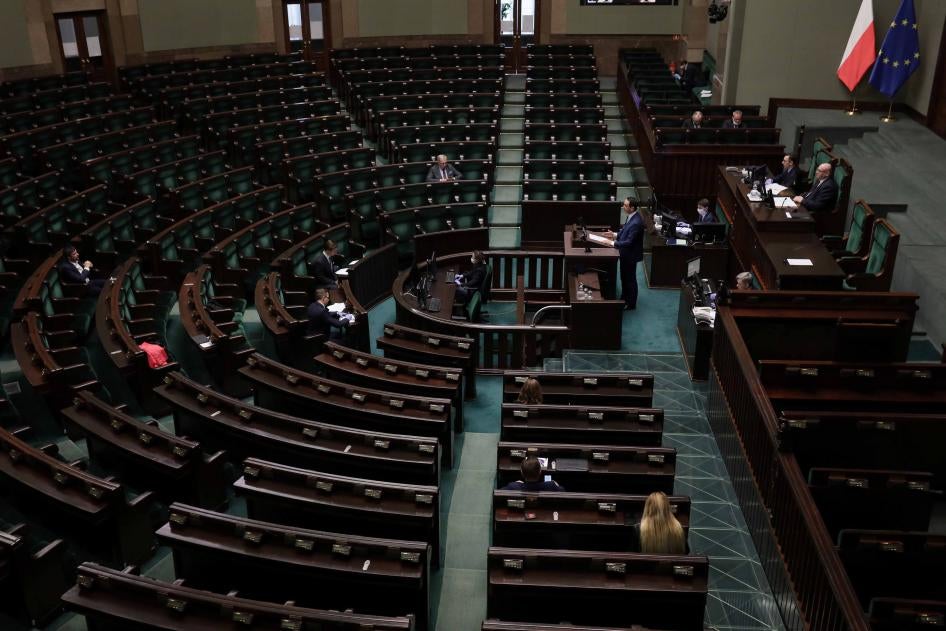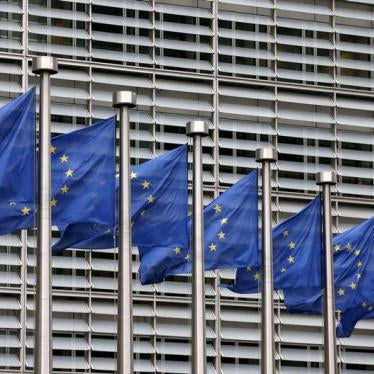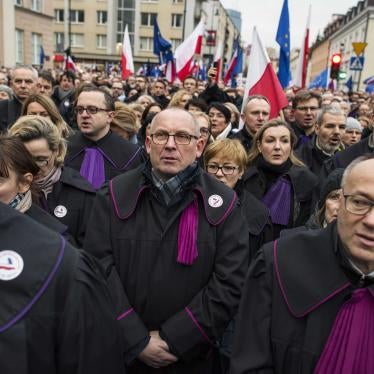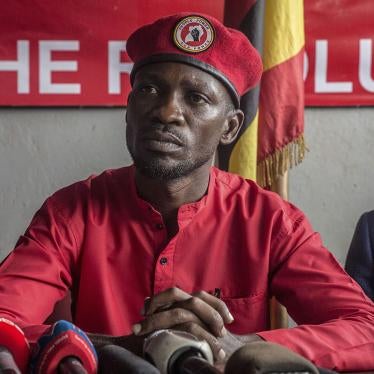(Budapest) – Poland should demonstrate that it can both ensure a free and fair vote and protect public health in upcoming presidential elections, Human Rights Watch said today. If not, Poland should postpone the vote for the shortest time necessary until that is possible.
The ruling party in Poland is currently pursuing only two options – holding elections as scheduled on May 10, 2020 via a hastily approved and created mail-in voting system or extending the incumbent president’s term by two years. Both options pose separate but equally serious concerns about free and fair elections and democratic rule of law.
“Poland’s voting process should protect voters during the pandemic. It’s no solution to rush through a potentially flawed voting system or to postpone the election by two years,” said Lydia Gall, senior Balkan and Eastern European Union researcher at Human Rights Watch. “Parliament should ensure that the election process is predictable, free, and fair, which may require postponing the voting for a short period.”
On April 6, less than five weeks before the scheduled vote, the Sejm, the lower house of parliament, where the ruling Law and Justice party has a majority, adopted a bill introducing mail-in voting. The bill is pending a vote in the Senate, the upper house, where the opposition has a majority.
Although the law has yet to be adopted, local media reports state that the government is already rolling out a system for the country’s first vote completely carried out by mail, a massive logistical undertaking. Given the unprecedented nature of such full-scale mail-in voting in Poland, and the extremely short time frame, it appears very unlikely – if not impossible – that the process will guarantee fairness and transparency, Human Rights Watch said.
As an alternative, on April 6, ruling party members of the Sejm submitted another bill seeking to change the constitution to extend the term of President Andrzej Duda, a ruling party ally, from five years to seven. If adopted, the May 10 elections would be canceled. To seek a constitutional change to extend the presidential term by almost 50 percent so close to the election flies in the face of the Polish constitution and European electoral practices.
All presidential candidates suspended their campaigns in late March due to the Covid-19 pandemic and limitations on public gatherings. But Duda gets extensive coverage in government-friendly media. This gives him an unfair advantage and raises concerns about all candidates’ ability to campaign freely and fairly.
The United Nations Human Rights Committee and the European Court of Human Rights have emphasized the centrality of freedom of expression and equitable access to media, as well as to voter education, to ensure the effective exercise of the right to vote (article 25 of the International Covenant on Civil and Political Rights, article 3 of Protocol 1 of the European Convention on Human Rights).
On April 7, the director of the Office for Democratic Institutions and Human Rights of the Organization (ODIHR) for Security and Cooperation in Europe expressed concerns that “if the presidential election goes ahead under the current circumstances, it may fall short of a number of international standards.” In an April 27 opinion, ODIHR called on Poland to introduce changes only to the electoral framework well in advance of elections in order to preserve legal certainty and allow sufficient time for preparations and voter education. On April 8, the co-rapporteurs on the situation in Poland for the Parliamentary Assembly of the Council of Europe recommended postponing the elections to the second half of this year.
While parliament has a duty to ensure that voters’ health is not put at risk to exercise their right to vote, it also has a duty to guarantee elections are free and fair and in accordance with domestic and international law, Human Rights Watch said. Poland’s government has not considered other possibilities to ensure a free and fair vote under the current circumstances.
The Polish constitution and Polish law already provide for circumstances in which the government could postpone elections during a public health emergency and “reasonably prolong” the position of incumbents, including the president. The government would need to declare a state of emergency due to public health reasons, and ensure that extraordinary measures taken afterward are strictly necessary and proportionate to address the emergency, limited in time, and subject to regular parliamentary and judicial review and scrutiny.
The attempt by the ruling party to push at the last-minute for fundamental constitutional change or to seek hasty changes to electoral laws sits poorly against the backdrop of the government’s other recent attacks on the rule of law and democratic institutions in Poland.
Since the Law and Justice party came into power in 2015, it has hijacked the constitutional tribunal to replace judges with party loyalists and attempted to fire the head of the Supreme Court. The government has compromised the independence of common courts, with judges and prosecutors facing disciplinary proceedings and public shaming if they stand up for the rule of law. The government is waging a war on independent journalists, civil society and human rights groups, activists, and others who criticize the government’s populist policies.
Acting on concerns that government action undermined the rule of law, in December 2017 the European Commission initiated legal action against Poland under article 7 of the Treaty of the European Union. The Court of Justice of the EU in June 2019 ruled that Polish laws forcing Supreme Court judges into retirement violated EU law and judicial independence. In November 2019, the Court of Justice stated that lowering the retirement age for judges in common courts was contrary to EU law, and in April 2020, the court ordered Poland to suspend the activities of the Supreme Court’s disciplinary chamber.
“Elections should be safe, free, and fair at all times, including during a deadly pandemic,” Gall said. “Rather than present parliament with options that dangerously undermine the integrity of Poland’s democracy, the governing party should propose serious measures that can guarantee free elections during a health crisis.”









